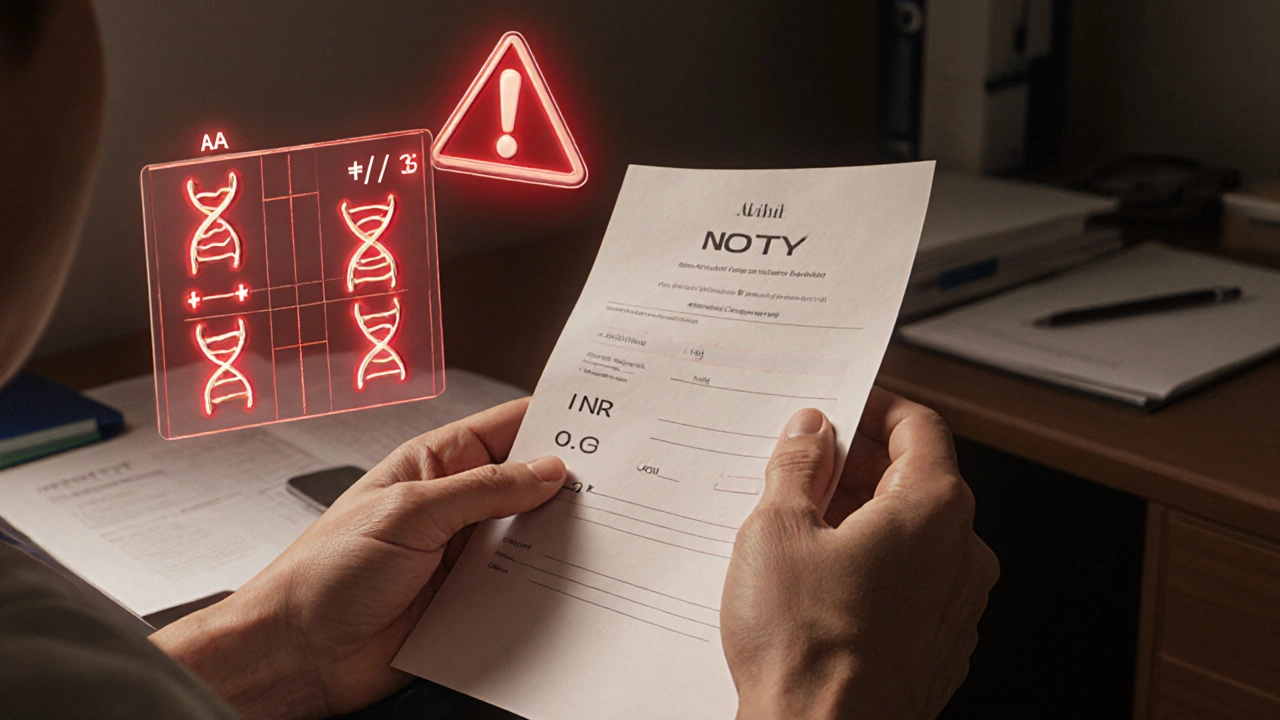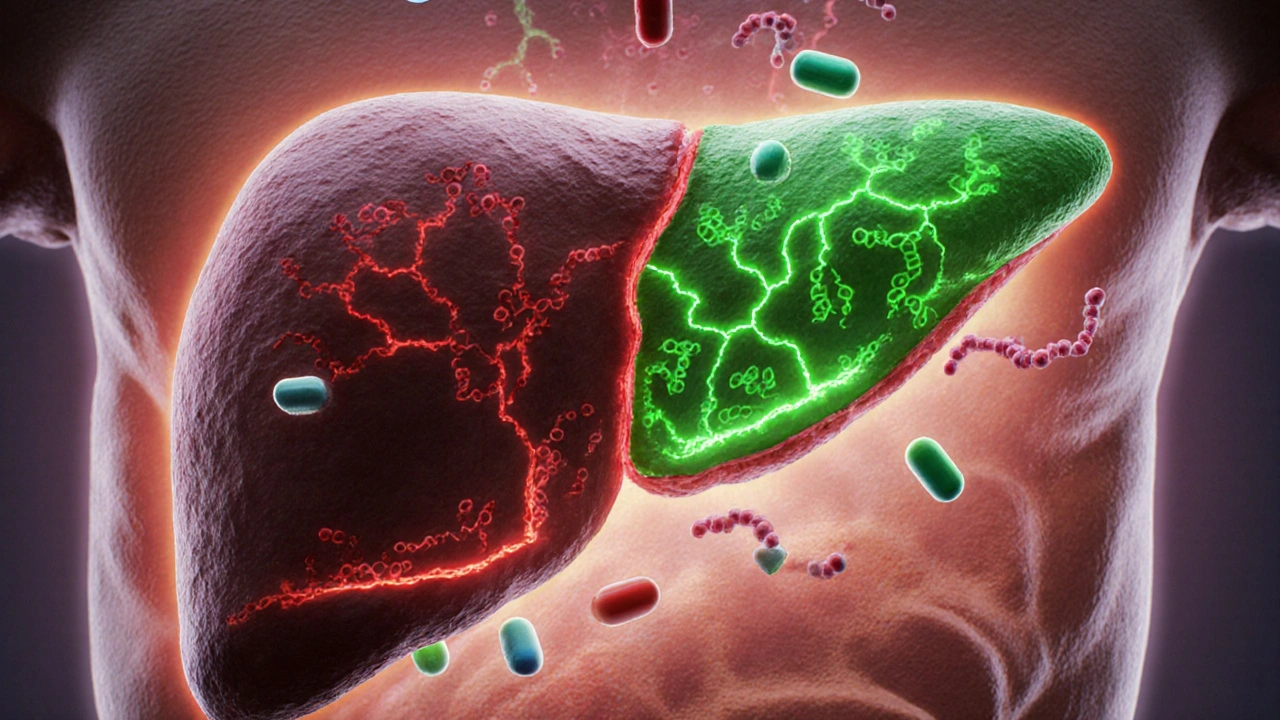Warfarin Dosing Calculator
Based on CPIC guidelines and genetic data from the article.
Why Some People Bleed Too Much on Warfarin
Warfarin has been used for over 70 years to prevent dangerous blood clots. But for many people, getting the dose right is a guessing game. One person might need 5 mg a day, while another needs 15 mg just to stay in the safe zone. The reason? Genetics. Two genes-CYP2C9 and VKORC1-control how your body handles warfarin. If you have certain versions of these genes, even a small dose can send your blood thinning too far, leading to nosebleeds, bruising, or worse-internal bleeding.
How Warfarin Actually Works
Warfarin doesn’t dissolve clots. It stops new ones from forming by blocking vitamin K, which your liver needs to make clotting proteins. The enzyme that warfarin targets is called VKORC1. Without it, vitamin K can’t recycle, and clotting factors don’t get activated. But here’s the catch: warfarin doesn’t work the same for everyone. Some people’s VKORC1 enzymes are naturally less active. Others clear warfarin from their blood too slowly. Both lead to the same problem: too much drug in the system, too little control.
The VKORC1 Gene: Your Body’s Warfarin Sensitivity Switch
The VKORC1 gene tells your body how much of the warfarin-targeting enzyme to make. The most common variant, called -1639G>A (rs9923231), changes how much enzyme you produce. If you have two copies of the A version (AA genotype), your body makes about 40% less enzyme than someone with two G versions (GG). That means you need far less warfarin to get the same effect. Studies show AA carriers often need just 5-7 mg per week. GG carriers? They might need 28-42 mg per week. That’s a sixfold difference.
Without knowing your genotype, starting at a standard 5 mg daily dose could be dangerous for an AA carrier. One patient from a Reddit thread described going to the ER with an INR of 6.2-more than three times the upper limit-after being started on a normal dose. Her doctor didn’t test her genes. She was lucky to survive.
The CYP2C9 Gene: Your Body’s Warfarin Cleaner
Warfarin comes in two forms: R and S. The S-form is five times stronger. Your liver uses the CYP2C9 enzyme to break it down. But not everyone has the same version of this enzyme. Two common variants-CYP2C9*2 and CYP2C9*3-make the enzyme work poorly. CYP2C9*3 is especially powerful: carriers clear S-warfarin 80% slower than normal. That means the drug builds up, even at low doses.
People with CYP2C9*3/*3 (two bad copies) often need less than half the average dose. A 2018 study found these patients had an 83% higher chance of their INR shooting past 4 in the first week. That’s the danger zone. INR above 4 means your blood takes way too long to clot. A fall, a cut, even a sneeze can turn into a medical emergency.

When Both Genes Go Wrong
The real risk comes when you inherit bad versions of both genes. Someone with VKORC1 AA and CYP2C9*3/*3 is in the highest risk category. These patients often need less than 2 mg per day. Yet, without genetic testing, most doctors start them at 5 mg. The result? A 2020 review found these patients had nearly double the risk of dangerous bleeding in the first 30 days.
One patient, u/WarfarinWarrior on Reddit, spent six months with wild INR swings-sometimes 1.8, sometimes 7.5-before genetic testing revealed he carried CYP2C9*3. His dose dropped from 5 mg to 2.5 mg. His INR stabilized within weeks. He said it was the first time he felt in control of his treatment.
Genetic Testing: Is It Worth It?
Yes-for the right people. The EU-PACT trial showed genotype-guided dosing reduced major bleeding by 32% in the first 90 days. The 2025 European Heart Journal meta-analysis confirmed a 27% drop in bleeding risk. But here’s the problem: only 5-15% of U.S. patients get tested. Why? Cost, confusion, and inertia.
Testing costs $250-$500 out-of-pocket in the U.S., but Medicare covers it under CPT codes 81225 and 81227. Turnaround time is 3-5 days. The results are clear-cut: low, medium, or high dose based on genotype. The Clinical Pharmacogenetics Implementation Consortium (CPIC) has a simple algorithm doctors can follow. At Vanderbilt University, using this system cut the time to reach a stable INR by nearly two days.
But many doctors don’t know the guidelines. A 2023 survey found only 38% of primary care doctors could correctly explain how CYP2C9*3 affects warfarin metabolism. That’s a gap between science and practice.
Why DOACs Are Taking Over
Drugs like apixaban and rivaroxaban don’t need genetic testing. They don’t need weekly blood tests. They’re easier. That’s why warfarin use dropped from 68% to 42% among new atrial fibrillation patients between 2010 and 2018.
But warfarin isn’t dead. It’s still the only option for people with mechanical heart valves. It’s also cheaper and reversible. If someone bleeds badly, you can give them vitamin K or fresh plasma to reverse it. DOACs don’t have reliable reversal agents for all cases.
So if you’re on warfarin long-term-especially if you’re older, have kidney issues, or have had bleeding before-genetic testing isn’t just helpful. It could be lifesaving.

What Patients Are Saying
A 2022 survey of 1,247 warfarin users found that 74% of those who got tested reported higher satisfaction with their treatment. They felt more confident, less anxious, and more in control. But 61% also said insurance made testing hard to get. One patient wrote: "I had to pay $400 out of pocket because my insurer said it was ‘not medically necessary.’ I almost died because of it."
What’s Next for Warfarin Genetics
The market for pharmacogenetic testing is growing fast-projected to hit $14.8 billion by 2029. Warfarin testing makes up about 12-15% of that. Costs are falling. By 2027, tests may drop below $100. The Warfarin Genotype Implementation Network (WaGIN), launched in 2025, plans to enroll 50,000 patients to prove real-world benefits.
The American Society of Hematology is expected to strengthen its recommendations for testing in 2025. More insurers will likely follow. The data is no longer theoretical. It’s clinical. It’s real. And it’s saving lives.
Should You Get Tested?
If you’re starting warfarin and plan to be on it for more than a few months, ask your doctor about genetic testing. Especially if:
- You’ve had a previous bleeding episode on warfarin
- You’re older than 65
- You have a history of falls or fractures
- You’re taking other drugs that interact with warfarin (like antibiotics or NSAIDs)
- Your INR keeps swinging up and down
Testing won’t guarantee you won’t bleed. But it gives you a fighting chance. It turns guesswork into science. And in anticoagulation, that’s everything.
Do all patients on warfarin need genetic testing?
No. Genetic testing is most useful for people who will be on warfarin long-term-like those with atrial fibrillation, deep vein thrombosis, or mechanical heart valves. For short-term use, such as after surgery, the benefits are less clear. But if you’ve had trouble with dosing before or have a family history of bleeding on warfarin, testing is strongly recommended.
Can I get tested without a doctor’s order?
In the U.S., you can order direct-to-consumer genetic tests from companies like 23andMe or Ancestry, but they don’t report CYP2C9 or VKORC1 results in a clinically actionable format. For medical use, you need a test ordered by a provider that’s processed by a CLIA-certified lab. Insurance coverage also requires a provider order.
How long does it take to get results?
Standard lab testing takes 3 to 5 business days. Some urgent care centers and hospital labs offer faster turnaround-sometimes under 48 hours-if the test is flagged as clinically urgent. Your doctor can request expedited processing if you’re starting warfarin soon.
Does Medicare cover warfarin genetic testing?
Yes. Medicare covers CYP2C9 (CPT 81225) and VKORC1 (CPT 81227) testing when ordered by a provider for patients starting long-term warfarin therapy. Coverage is based on FDA labeling and CPIC guidelines. However, prior authorization may be required depending on your Medicare Advantage plan.
What if my doctor says testing isn’t necessary?
Ask for a referral to a hematologist or anticoagulation clinic. These specialists are more familiar with pharmacogenetics. You can also ask for the CPIC dosing guidelines (available online). Many doctors are unaware of the latest evidence. If you’ve had unstable INRs or bleeding, you have a strong case for testing. Don’t accept "we’ve always done it this way" as an answer.

